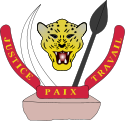- Democratic Republic of the Congo presidential election, 1970
-
Democratic Republic of the Congo 
This article is part of the series:
Politics and government of
the Democratic Republic of the Congo- Constitution
- President (List)
- Government
- Prime Minister (List)
- Parliament
- Political parties
- Elections
- Constitutional Court
- Court of Cassation
- Subdivisions
- MONUC
- Foreign relations
A presidential election was held in the Democratic Republic of the Congo on 1 November 1970. The only candidate was Joseph Mobutu, who had taken power in a military coup five years earlier. The election took the format of a "yes" or "no" vote for Mobutu's candidacy, with the results showing he won more "yes" votes than the number of registered voters, even though voting was not compulsory.[1]
Contents
Background
Following the promulgation of a new constitution after a referendum in 1964, general elections were held in the newly renamed Democratic Republic of the Congo in March and April in 1965. The elections were won by the Congolese National Convention, led by former seccessionist leader Moise Tshombe, which took 122 of the 177 seats. However, President Joseph Kasa-Vubu later dismissed Tshombe and appointed Évariste Kimba of the Congolese Democratic Front Prime Minister instead. In a vote in parliament on 14 November, Kimba failed to have his government approved.[2] However, Kasa-Vubu reappointed him as Prime Minister the following day. Ten days later Mobutu led a military coup and installed himself as President, banning political parties.
On 20 May 1967 Mobutu formed the Popular Movement of the Revolution, with all citizens automatically becoming members of the party. In June 1967 a new constitution was drawn up, establishing a unitary state with a presidential system and unicameral parliament. It also limited the number of political parties to two, and enfranchised women.[1] It was approved by a referendum in which 97.8% of voters voted for it.[3]
Following a census in early 1970, presidential elections were organised for 1 November. The date was set so that Mobutu would have passed his fortieth birthday by the time the elections occurred, as the constitution stated that candidates must be at least forty years old.[1]
Results
With Mobutu as the only candidate, voters had the choice of a green ballot paper representing a "yes" vote, or a red paper, representing a "no" vote. The ballot was not secret.[1] The number of votes (10,131,826) was over 30,000 more than the number of registered voters (10,101,330).[4]
Candidate Party Votes % Joseph Mobutu Popular Movement of the Revolution 10,131,669 100 Invalid/blank votes 157 - Total 10,131,826 100 Source: Nohlen et al Aftermath
Parliamentary elections were held on 15 November in a similar fashion, with the official candidates being approved by over 99% of the voters.[1] The country was renamed Zaire the following year, and Mobutu changed his own name to Mobutu Sese Seko in 1972. He continued to rule the country until being overthrown in 1997.
References
- ^ a b c d e DRC: Elections under the Second Republic EISA
- ^ DRC: Constitutional Crisis between Kasavubu and Tshombe EISA
- ^ Elections in Congo-Kinshasa African Elections Database
- ^ Nohlen, D, Krennerich, M & Thibaut, B (1999) Elections in Africa: A data handbook, p294 ISBN 0198296452
 Elections and referendums in the Democratic Republic of the Congo
Elections and referendums in the Democratic Republic of the CongoPresidential elections Parliamentary elections Senatorial elections Gubernatorial elections Referendums Categories:- 1970 elections in Africa
- Elections in the Democratic Republic of the Congo
- 1970 in the Democratic Republic of the Congo
- Single-party elections
- Single-candidate elections
Wikimedia Foundation. 2010.
